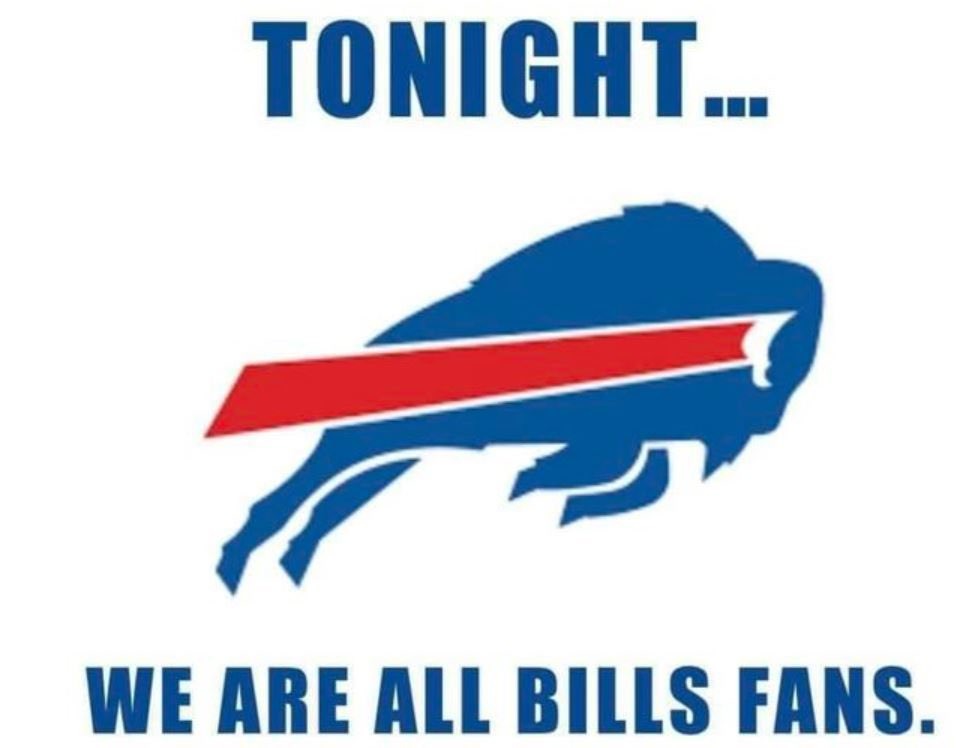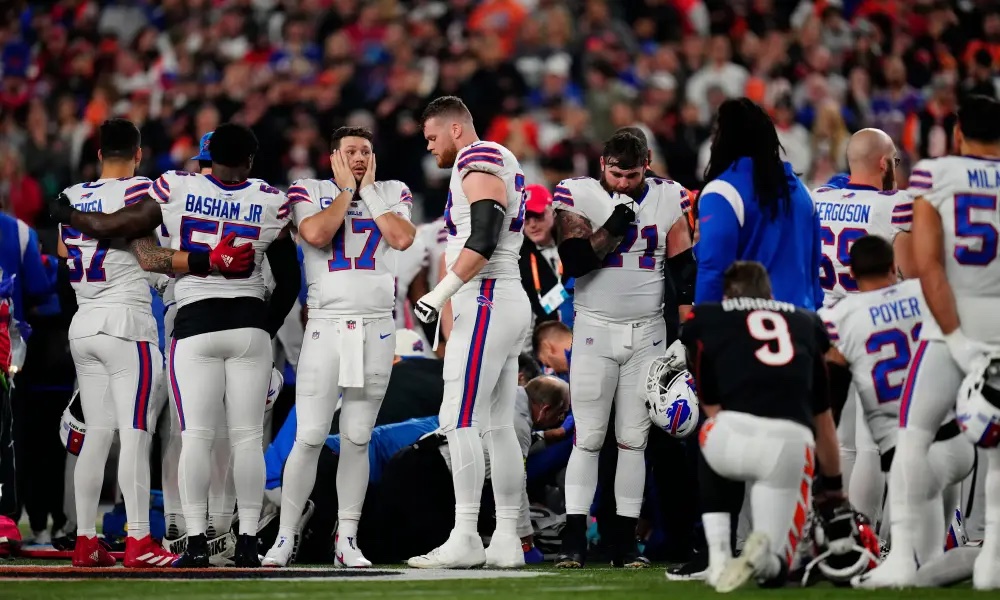
We recently passed the one-year anniversary of the night Buffalo Bills safety Damar Hamlin nearly died on the field in front of us. It’s one of those rare moments where everyone remembers exactly where they were. In the days that followed I replayed the events of that night on a loop: Josh Allen’s eyes wide in shock; players kneeling in prayer. Eventually, I realized there was something beautiful in this near tragedy. Everyone was rooting for Damar: Bills fans, Bengals fans, the entire country. In an instant, Damar was no longer an opponent but one of our own, reminding us of the fragility of being human. Outside of 9/11, I don’t remember a time when it felt like we were all on the same team. I distinctly recall thinking, My God, wouldn’t it be great if we could stay in this place?
My grandparents spoke with such reverence about their connection to fellow Americans, a connection that transcended all else. Maybe it was the combination of The Great Depression and World War II that bound them together. Whatever the reason, today that sentiment is foreign. The most transcendent identity now isn’t "American," it’s Democrat or Republican. Damar Hamlin provided a brief glimpse of what it’s like to rise above our respective "teams."
Sports has always been the go-to metaphor for tribalism, our propensity to separate ourselves into US and THEM. Now, political "fans" have eclipsed all others in terms of tribal intensity. It’s not so much an increase in love for our own team as it is an explosion in the amount of hatred we have for the other. Psychologists call this negative partisanship. Sure, my side winning would be nice, but what would really make me happy is your side losing in humiliating fashion.
Negative partisanship is proof that, left unchecked, tribalism can go too far. I once heard a friend muse about whether or not he would be genuinely sad if Trump were assassinated. No one in the room batted an eyelash. This friend is supposedly a liberal, guided by values of acceptance, empathy, and love.
Maybe the best evidence of this is the exponential increase increase in political threats and violence over the last several years. In 2017, Senator Steve Scalise was nearly assassinated. More recently, Nancy Pelosi’s husband was brutally attacked. There are many examples like this, and yet we continue to be surprised by our capacity for evil. This may be our Achilles heel. The uncomfortable truth is that, under the right circumstances, we are all capable of hatred and acting on that hate.
It’s useful to think of tribalism as a spectrum. Some of it can be good—it’s what led our grandparents to the sort of self-sacrifice they’re now famous for. It’s also what fills me with love for the Bills despite their astounding knack for inventing new ways to lose. The question is how do we harness the good parts of tribalism while minimizing the bad?
As passionate as we are, there are several external factors in sports that "turn down" the volume of our tribal intensity. For starters, teams play different opponents every week. And games only last a few hours. There’s also a lengthy offseason. All of this gives us the opportunity to get to a more… rational place: Maybe I don’t actually want to kill Tom Brady.
The environmental forces that turn down tribalism in sports don’t exist in politics. If anything, the endless campaigns, 24-hour news cycles, and social media algorithms turn up our worst tribal instincts. Our news feed is designed to evoke the most emotional reaction possible by showing us a steady stream of the worst actors from "the other side." One side effect, besides endless outrage, is that we greatly overestimate how many extremists there actually are. And virtually all of this occurs outside of our conscious awareness. As we spend more and more time in these toxic online spaces, I’m reminded of one of the most important lessons from my public health training: environment matters.
The stakes are also much higher in politics. It is not just a game; it is life or death on a daily basis. The recent repeal of Roe vs. Wade has either saved or ruined countless lives, depending on your beliefs.
In that sense, politics is much more religion than it is sports. And religion is made up of our "sacred values"—the intensely emotional beliefs we hold as deeply meaningful and worth fighting for. If you ask someone why they are pro-choice, they will likely answer with the same passionate conviction as when you ask someone why they are Christian. Passion alone isn’t necessarily a problem; the conflict occurs when we want our sacred values to be everyone’s sacred values.
This brings us to one of our greatest challenges. We like to think of ourselves as rational beings. However, to the extent this is true, we enlist this rationality in service of our emotions. Said another way, we feel something first, often intensely, and then look for evidence to confirm the truth of that feeling (see here). This process happens so fast we don't even notice it.
This tendency is incredibly difficult to overcome. It’s also imperative that we learn how to do so. If we don’t, we will continue to mistake the intensity of our emotions with the "rightness" of our cause. It is no wonder that morality (and I would include politics and religion) has been called "a battle to determine whose ‘right is ‘righter.’" And if we’re "right," why would we compromise?
So, here we are, a bunch of highly emotional beings, convinced of our own rationality and righteousness, banding together to fight against those who feel just as strongly about their cause. If I had the answer for how to fix this tribalism-gone-awry, I would’ve opened with that. Like anything involving humans, it’s complicated.
Knowing what we’re up against is a good start. Our environment and our wiring are conspiring against us.
Experts like Tristan Harris are leading the fight against the sinister online environmental forces that are bringing out the worst in us. Individually and collectively, we can demand guardrails for tech companies and insist that they become more humane. In the meantime, it’s on us to recognize that our attention is being manipulated for profit and that the outrage and fear we feel is (partially) manufactured.
But even if we changed every aspect of our environment, we can’t change our wiring. So, we should at least understand what makes us tick. The values we hold sacred, and that influence our vote, are largely biological first and reinforced by culture culture second. Add in our current political polarization and you realize that you’re about as likely to change someone’s political—which we now know are moral—beliefs, as you are to train me to be an extrovert (good luck).
Once I knew this, I was able to reframe the way that I thought about our differences. THEY aren’t changing their mind for the same reason you aren’t changing yours. Suddenly, I no longer viewed my crazy conservative uncle as my sworn enemy (with questionable motives and intelligence), but as someone equally bound by the absurdity of the human condition. We were entirely different and exactly the same.
Harnessing this knowledge can do for politics what Damar Hamlin did for sports. What Damar revealed is just how quickly the lines around "us" can change.
The ability to see US in THEM is both humanity’s greatest obstacle and our greatest potential. Here’s hoping that we can get back to this place and that it doesn’t take someone dying to get us there.

.png)
